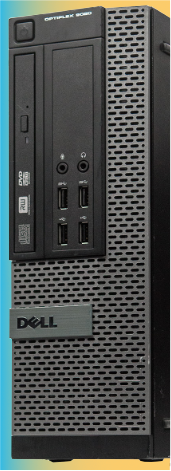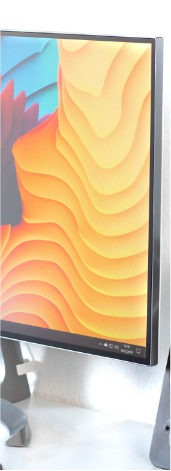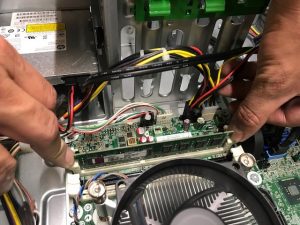Should I Replace Or Repair My Computer?
You know every square inch of your computer, from the keys that seem to stick, to the strange popups that occur every time you reboot. You may have even thrown a few stickers to it over time. It’s become truly a personal computer, especially if it’s a laptop that goes everywhere with you…
However, you’re noticing that it’s taking longer to load sites and you’re getting tired of that rainbow spinning wheel or hourglass telling you “I’m thinking, I’m thinking!” You fear it may be time to replace it for a newer model and you loathe the breaking in period that you go through in resetting your preferences.
Before you decide to pitch the PC, consider a compromise: upgrading what you have, on the inside. Despite the signs that some say point to replacing, we know there’s a lot your laptop or desktop can still do if you simply replace the components inside, for far less.
Here are a few trouble spots, what can be done, and when it may be time to throw in the towel:
My computer is really slow
This one’s a bit tricky and the most common, because slowing speeds can be caused by a few factors: malware, an over abundance of apps and not enough RAM to handle it, or apps that take up an abundance of RAM to operate by themselves, like Adobe graphics or gaming apps.
The RAM capacity in your computer often has room for improvement, and adding a new RAM stick can speed its performance.
What you can fix:
- RAM can be added to your computer at minimal cost, which will increase the speed in which your computer can process the information.
- Replacing your mechanical hard drive (which is what most computers come equipped with) with a solid state drive (SSD), which is designed for speed and efficiency
- An external hard drive may also help you store data that you don’t use often in order to free up space on your system. Photos, videos and similar data are best kept off of your main drive.
- You may also need a system scan to detect any issues with viruses or malware that are tying up your speed.
- Reinstalling the operating system you already have; this involves wiping your drive and refreshing the system
When it’s time to time to say goodbye:
- When your RAM is maxed out and you’re still operating at 80 percent capacity.
- Your version of the computer’s operating system is outdated, and you don’t have the ability to update it
- When a diagnostic review of your computer reveals issues with the hardware like the motherboard. When that’s gone, the cost of repair will exceed the value of the unit
My computer gets really hot
You’ll notice this especially if your laptop is making your thighs sweat, or you hear the fan running constantly. Your processor’s limit for temperature will depend on your model, but in general if you’re noticing the heat is out of the norm for your device, there’s something wrong with the hardware designed to cool your processor, or your processor is exceeding its clock speed.
What you can fix:
- If the sensor that monitors the processor’s temperature is faulty
- Thermal paste from previous maintenance needs replacing to draw the heat away from the processor
- Like anyone who’s overheating, a fan (or two) may just do the trick. Your computer’s fan may be malfunctioning, or because of the programs you are running, may need to have a sidekick to help moderate the temps.
- Cleaning: dust and dirt can sabotage the internal temps of your computer, causing hardware that’s designed for cooling to operate inefficiently or not at all. Having a skilled tech carefully clean the contacts inside your device can breathe some fresh air throughout its inner workings.
When it’s time to say goodbye:
- The types of programs being run push the limits of your processor and no amount of fans will fix it.
- You are not able to increase the number of fans to cool
My computer won’t boot
It’s curtains, then right? Not so fast. We’ve often resurrect “dead” computers…how?
What you can fix:
- Again it’s possible that replacing your operating system will breathe new life into your computer
- A check for any viruses may also reveal the culprit. We isolate the virus or complete wipe and refresh your operating system to eliminate it.
- We recommend Norton or a similar antivirus to extend the life of your computer and protect your data as well.
When it’s time to say goodbye:
- Any larger system failure that involves the motherboard (also known as the logic board)
- If the cost of repair exceeds the value of the unit.
Overall we try to help you stretch your budget with your computer’s lifespan, and will be honest with you when we’ve done all we can. As technology constantly advances, other issues like connections that are obsolete, streaming and gaming programs that beg for speed and RAM and the inability to upgrade with the hardware you have may require a complete replacement of your device. In the meantime, stay aware of all of your options and keep your computer maintenanced to lengthen its lifespan and its value.








